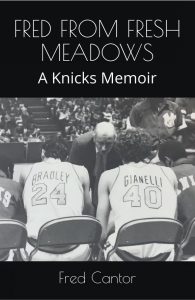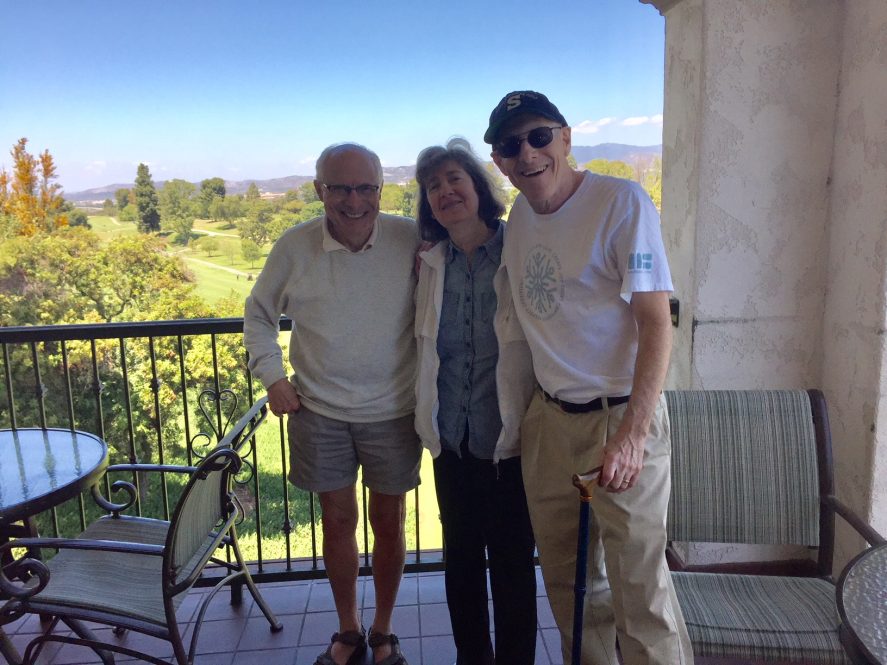After the coronavirus pandemic stranded him in California, Fred Cantor ’78 JD found his thoughts turning to his lifelong love of the New York Knicks — and the enduring bond it fostered with UConn Law Professor Lewis Kurlantzick.
The thoughts and memories turned into a book, “Fred From Fresh Meadows: A Knicks Memoir,” published in November by The Strickland Press. Proceeds will benefit the John Starks Foundation, a college scholarship fund established by the retired Knicks star.

Cantor and his wife, Debra Silberstein, split their time between Westport and Orange County, Calif., and they were in California when the pandemic struck. Cantor’s doctor advised him not to travel because of serious health issues. Bored and isolated at home, he put his energy into the book.
He wrote that his first memory of the Knicks dates back to 1962, when he was 9 years old. He was flipping through The New York Times sports section when he read that a player named Wilt Chamberlain had scored 100 points against the Knicks the night before.
“How could any individual score 100 points in an NBA game?” Cantor remembered thinking at the time. “Sure, Roger Maris had hit 61 homers the previous fall. But 100 points in a game?! That seemed impossible.”
Fascinated not only by Chamberlain’s virtuosity but also by the Knicks’ astounding loss, Cantor was hooked — on the underdogs. The book details his extreme Knicks fandom through multiple careers, major medical procedures, and even a chance encounter with TV producer Larry David. Cantor asked, and David confirmed, that David’s daughter, Cazzie, was named after Knicks great Cazzie Russell.
“Writing was a great way to be creative and engage with something when I was feeling up to it,” he says. “It was never my intention to do anything with the book, but then I showed it to some friends, and they liked it and encouraged me to try to publish it.”
The book also details Cantor’s friendship of nearly 50 years with Kurlantzick, which began when Cantor took Kurlantzick’s Legal Writing class at UConn Law and they discovered their shared passion for sports, especially the Knicks. Their first conversation, in September 1975, was memorable.
Cantor had unexpectedly scored a ticket to Game 6 of the World Series between the Boston Red Sox and the Cincinnati Reds at Fenway Park. He could attend the game or he could complete an assignment for Kurlantzick’s class, but he couldn’t do both. He decided to explain the situation to Kurlantzick and ask for an extension. He remembers growing more and more anxious as he made his case and Kurlantzick remained silent and stone-faced.
When Cantor finished, Kurlantzick was outraged. “Are you crazy?” he demanded. If Cantor missed Game 6 of the World Series for a writing assignment, Kurlantzick said, he surely must be out of his mind. Cantor got his extension and the two got to talking.
“Fred and I immediately clicked after that moment and once we realized we both live and die by the New York Knicks,” Kurlantzick says. “Fred has one of the brightest, most creative minds, and I’m so thrilled we’ve stayed in touch all these years.”
Their friendship blossomed the following year when Cantor moved to a new apartment with cable TV. Kurlantzick was thrilled and offered to split the cable bill so they could watch Knicks games together. Cantor even gave Kurlantzick a spare key so that he could watch games when Cantor was away.
The two attended numerous games throughout the years and kept in touch. Kurlantzick visited Cantor in California in 2018, and the professor is the first person Cantor thanks in the book’s acknowledgements.
The friendship has influenced Cantor’s life in many ways. He joked that the betrayal of Kurlantzick’s son — who became a Boston Celtics fan — convinced him not to have children.
Now formally retired, Kurlantzick continues to teach a sports law course. Cantor retired 10 years ago from his job with the City of New York, where he was working as a regulatory lawyer, when serious health problems prevented him from keeping a 9-5 schedule. At 67, he does what he can to keep himself as active as his health will allow.
He and Silberstein are still stuck in California, unsure when the pandemic will subside enough that it will be safe for them to travel. Meanwhile, Cantor has had some of his favorite Knicks memorabilia shipped to California, and he’s enjoying the reaction to the book.
“I think it’s a good read for any sports fan and I’m thrilled the proceeds will go to a good place,” he says. “As I look back on my life, I see so much of it in the context of that one season or that one team. It just made sense to write a story of my life that way.”



